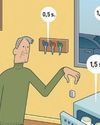Improved diagnostics and new treatments for prostate cancer mean

Once you turn 50, your risk for prostate cancer begins to increase—more than 80 per cent of men diagnosed are over 65, with northern Europe and North America leading the trend.Even a few years ago, prostate cancer patients had limited options, essentially choosing between mere surveillance and intervention that involved removing or destroying the entire prostate gland.
The former risked letting cancer progress too far while the latter brought prolonged side effects that left men miserable—incontinence, erectile dysfunction, loss of libido. And while less invasive treatments did exist, many clinicians were skeptical about their effectiveness.
“It’s been pretty stark,” says Dr Mark Emberton, professor of interventional oncology at University College Hospital, London (UCHL). “We either don’t treat you or we treat you maximally.”
But now some experts are reconsidering this view. With the latest technologies, once experimental methods may prove advantageous in some cases. New drugs have been approved, and studies have found that some novel drug combinations expand lifespan in patients whose tumour is aggressive. Some trials have had success in treating prostate cancer with immune vaccines.
These options offer more hope and less suffering, but they also present patients with more choices than ever. Even being screened for prostate cancer is now a choice—and a very debated one. And even if you are diagnosed, it doesn’t mean you need to be treated because many prostate cancers are so slow growing that men would succumb to other causes first. “You’re very unlikely to die from a low-risk prostate cancer within ten years of the diagnosis,” says Dr Henk van der Poel, a urologist at the Netherlands Cancer Institute.
While the debates continue, here’s what patients should know.
THE SCREENING CONUNDRUM
هذه القصة مأخوذة من طبعة May 2019 من Reader's Digest UK.
ابدأ النسخة التجريبية المجانية من Magzter GOLD لمدة 7 أيام للوصول إلى آلاف القصص المتميزة المنسقة وأكثر من 9,000 مجلة وصحيفة.
بالفعل مشترك ? تسجيل الدخول
هذه القصة مأخوذة من طبعة May 2019 من Reader's Digest UK.
ابدأ النسخة التجريبية المجانية من Magzter GOLD لمدة 7 أيام للوصول إلى آلاف القصص المتميزة المنسقة وأكثر من 9,000 مجلة وصحيفة.
بالفعل مشترك? تسجيل الدخول

EVERY SECOND COUNTS: TIPS TO WIN THE RACE AGAINST TIME
Do you want to save 1.5 seconds every day of your life? According to the dishwasher expert at the consumer organisation Choice, there’s no need to insert the dishwashing tablet into the compartment inside the door.

May Fiction
An escaped slave's perspective renews Huckleberry Finn and the seconds tick down to nuclear Armageddon in Miriam Sallon’s top literary picks this month

Wine Not
In a time of warning studies about alcohol consumption, Paola Westbeek looks at non-alcoholic wines, how they taste and if they pair with food

Train Booking Hacks
With the cost of train travel seemingly always rising, Andy Webb gives some tips to save on ticket prices

JOURNEY TO SALTEN, NORWAY, UNDER THE MIDNIGHT SUN
Here, far from the crowds, in opal clarity, from May to September, the sun knows no rest. As soon as it’s about to set, it rises again

My Britain: Cheltenham
A YEAR IN CHELTENHAM sees a jazz festival, a science festival, a classical music festival and a literature festival. Few towns with 120,000 residents can boast such a huge cultural output!

GET A GREEN(ER) THUMB
Whether you love digging in the dirt, planting seeds and reaping the bounty that bursts forth, or find the whole idea of gardening intimidating, this spring offers the promise of a fresh start.

Under The GRANDFLUENCE Suzi Grant
After working in TV and radio as an author and nutritionist, Suzi Grant started a blog alternativeageing.net) and an Instagram account alternativeageing). She talks to Ian Chaddock about positive ageing”

Sam Quek: If I Ruled The World
Sam Quek MBE is an Olympic gold medalwinning hockey player, team captain on A Question of Sport and host of podcast series Amazing Starts Here

Stand Tall, Ladies
Shorter men may be having their moment, but where are the tall women?